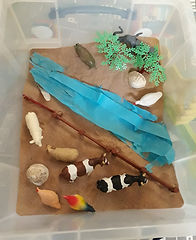
I am a Play Therapy UK (PTUK) accredited Therapeutic Play and Creative Arts Therapist. Play in therapy helps children to express themselves in their own way, especially if they are struggling to understand how they are feeling or are finding it hard to put their experiences into words.


Why Play Therapy?
Therapy sessions can be provided for children with a range of needs. Using play in therapy helps children to express themselves in their own way especially if they are struggling to understand how they are feeling or are finding it hard to put their experiences into words. Using the child's natural medium of play means that the child can explore their thoughts and feelings in creative and dynamic ways, without having to use words to articulate themselves. Therapeutic play sessions aim to build a child’s ability to develop healthy and resilient relationships, and to work through traumatic experiences which may be preoccupying them and make learning at school challenging.

Teachers are well placed to notice when a child they know needs extra support in school for educational, social, emotional reasons.
12 one-to-one, 30-40-minute therapy sessions with the student.
Baseline and end of therapy reviews are conducted with the parent/caregiver, and referrer/teacher.
End of therapy reports are written and provided to parent/caregiver and referrer/teacher.

Parents are often first to notice when their child needs extra support for educational, social, emotional reasons.
Therapy sessions are provided for between 8 to 12 weeks but can be extended based on individual needs.
Baseline and end of therapy reviews are conducted with the parent/caregiver.
One-to-one, 30-40-minute therapy sessions with the child.
Therapy reports are written and provided to parent/caregiver.
Please contact for pricing breakdown.
Matthew Haywood
Therapeutic Play Practitioner
I have worked in a number of educational settings including special educational needs for over 11 years. I am a father to three children but also a bereaved parent; my wife and I lost our baby son who was devastatingly stillborn in 2018. Therapeutic play is beneficial to children struggling for a wide range of reasons. I work with children with social, emotional and behavioural difficulties, anxiety, and those struggling socially with peers. I have a personal interest in supporting children who have experienced a bereavement and work alongside a bereavement charity providing therapy sessions for bereaved children.


Qualifications
PTUK registered: 202004520
PTUK therapists undertake rigorous academic and clinical training before qualifying. To be registered with PTUK, all therapists must: have qualified via a PTUK, university approved, postgraduate course; be clinically supervised by an accredited supervisor; attend regular accredited professional development courses, and have an enhanced DBS check. PTUK practitioners are registered with the Professional Standards Authority, an independent organisation regulating and monitoring health and social care providers.
2.1 Hons degree in Child Development, Psychology, and Mental Health
A Distinction in Postgraduate Certificate in Therapeutic Play Skills.
I have worked in education for over 12 years.
I have liability insurance and am fully GDPR compliant.
Frequently Asked Questions
Please contact us if you have further questions.
How is play therapy different from other therapies?
Using play means that the child can explore their thoughts and feelings in creative and dynamic ways, without having to use words to articulate themselves. In Play Therapy sessions, children explore their own creativity and express themselves using media such as: drawing and painting, water and clay, sand tray and miniatures, guided imagery and relaxation techniques, drama and puppetry, poetry, movement and music.
Where do sessions take place?
School referral play therapy takes place in the child's school during the school day.
Private client sessions can be accommodated in clinic space in Tamworth with parking available and close to M42 junction 10.
How long does each therapy session last and cost?
All sessions run for between 30-40 minutes.
In school therapy sessions usually run for 12 to 20 one-to-one sessions.
Private client sessions run for between 8 to 12 one-to-one sessions.
In both cases more sessions can be added.
Pricing from £50 per session but please contact for more details.
Office Hours
New Clients Welcome
Mon - Fri: 8am - 5pm
Evenings: Appointments by arrangement
Weekends: Appointments by arrangement
Play Therapy
Play Therapy Toolkit

The play therapy tool-kit provides the resources for this child-centered approach.
Child Centered Approach

Guided by the 8 Axline Principles therapeutic play provides a platform for children to express themselves.

Axline Principles
The therapist must develop a warm, friendly relationship with the child, in which good rapport is established as soon as possible.
The therapist accepts the child as they are.
The therapist establishes a feeling of permissiveness in the relationship so that the child feels free to express there emotions completely
The therapist is alert to recognise the feelings the child is expressing and reflects those feelings back to them in such a manner that they gain insight into their behaviour.
The therapist maintains a deep respect for the child's ability to solve his own problems if given an opportunity to do so. The responsibility to make choices and to institute change is the child’s.
The therapist does not attempt to direct the child’s actions or conversation in any manner. The child leads the way; the therapist follows.
The therapist does not attempt to hurry the therapy along. It is a gradual process and is recognised as such by the therapist.
The therapist establishes only those limitations that are necessary to anchor the therapy to the world of reality and to make the child aware of their responsibility in the relationship.



